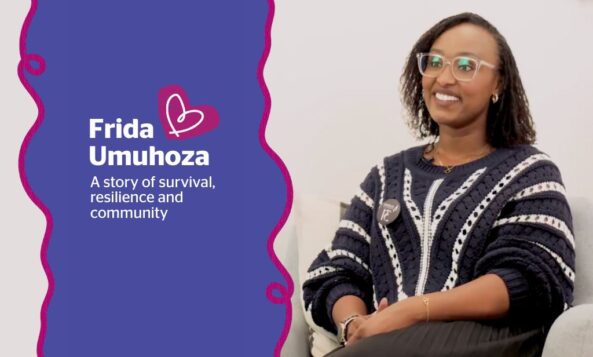
Frida Umuhoza: A story of survival, resilience and community
Frida Umuhoza is one of the heroes of the World Refugee Day Telethon, powered by the ASRC, this June 20. Frida’s journey is one of survival, resilience and the power of community, embodying this year’s World Refugee Day theme: Finding Freedom: Diversity in Community, and highlighting the strength of refugees in rebuilding their lives shattered by unimaginable tragedies.
Born in Rwanda, Frida was just 14 when her family was targeted during the 1994 Genocide against the Tutsi, one of the most horrific genocides in modern history. In the span of only three months, from April to 4 July 1994, more than a million Tutsi were killed.
“This was a time when neighbours were killing neighbours, Hutu neighbours carrying out the genocide against the Tutsi,” says Frida. “People we knew – people who came to our house, who ate with us – turned against us. There was nowhere to hide.”
In the group that came to kill Frida’s family on the morning of 7 May 1994, was someone Frida’s father had paid school fees for. She begged him to kill her with a club, to make it quicker.
But the blow to the head didn’t kill her. When Frida regained consciousness, she found herself buried alive, with her entire family around her dead. “I don’t know how long I was unconscious. But when I woke up, I was buried alive with my family.”
The genocide shocked the world, but as Frida points out, “genocide is not something that happens overnight.” The Tutsi lived with discrimination, killing and dehumanisation for many months before a call to massacre was broadcast over the radio waves.
As the sole survivor of her immediate family, Frida found her purpose in using her voice to educate communities about what genocide is, and how it starts, “because nobody is immune from that kind of behaviour. We see hate speech all the time. We see attacks all the time. Genocide is a seed that is planted in people’s minds, and it is watered with hate speech. So if you don’t speak against it, it can grow into something bigger.”
“My story is to remind everybody that we all have a responsibility,” says Frida. “To not be a bystander when we see hate, racism, or discrimination.”
Frida’s story is not only about survival, but also about the power of reclaiming agency. She has become a powerful advocate, sharing her story in schools, churches, community groups, and at global forums including the United Nations. Her bestselling memoir, Frida: Chosen to Die, Destined to Live, later revised as In the School of Resilience, chronicles her experiences and her belief in forgiveness and community.
“Resilience is not something that you graduate into,” says Frida. “You will never get to a point where you say, look, I’m resilient enough, nothing is going to touch me. It’s something that you build on every single day, every single stage of your life.”
Frida often uses Nelson Mandela’s quote: “People must learn to hate, and if they can learn to hate, they can be taught to love.” This philosophy underpins her approach to advocacy and healing: “Through so much hate, I learned love. The road of revenge, bitterness over what was done to me, is not one I want to take, or teach my children to take.”
“Each time I tell my story, I feel like I’m taking a little of the poison out,” she shares. “I’m disempowering the pain.”
Frida visits her home in Rwanda with her children and their friends. She is Rwanda right now, taking part in the annual commemoration of the anniversary of the genocide known as “Kwibuka” (“to remember”), and going through a haunting process of reburying her whole family.
As a way of honouring her family and her past, Frida rebuilt her childhood home, brick by brick, even put the same animals in, and helped a new family move in: “It was about restoration. Taking my power back. The plan was to wipe us out, and the plan failed when I survived. The plan failed when anyone survived.”
Frida teaches her children the legacy of their grandparents through stories, photos, and even a single dress – the only piece of her mother’s belongings she managed to save. “I’ve lived in five countries, but that dress always comes with me. I wear it from time to time, when I go to speak.”
In Australia, Frida has built a new community while staying deeply connected to her Rwandan roots. “I belong to this place, but home will always be home,” she says. “I’ve got to a point where I have two homes. But I make sure my children know where their roots are.”
Her message to new arrivals in Australia is filled with hope: “It won’t always be this hard. Things will get easier. And ten years from now, you’ll be having a completely different conversation.”
To the wider community, she offers a simple request: “Be kind. Be patient. You don’t know what someone has been through. Don’t say, ‘go back to where you came from’, because where they came from is probably hell.”
“Refugees and asylum seekers are very important people that come into our lives,” says Frida emphatically. “Even helping someone learn to use a bus card can make a huge difference, not just in that person’s life, but in the life of the next generation – we may be helping future doctors and teachers, we may be helping a future prime minister, even.”


Connect with us
Need help from the ASRC? Call 03 9326 6066 or visit us: Mon-Tue-Thur-Fri 10am -4pm. Closed on Wednesdays.